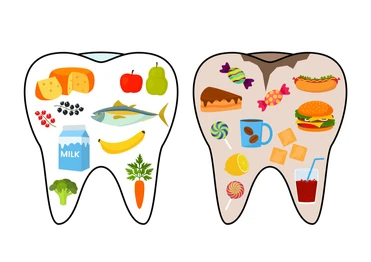6 Important points about how your Diet affects your Dental Health
The Impact of Diet on Oral Health
Eating makes you who you are. When it comes to your teeth, your general health is correlated with your dental health. Your teeth require a range of nutrients, just like your body does.
However, food’s nutritional value isn’t the only significant component. Your diet has a significant impact on preventing tooth decay and maintaining your oral health, from how food dissolves in your mouth to how frequently you consume particular meals and beverages to the combinations of foods and even the sequence in which you eat them.
The risks of acidic and sugary foods that we enjoy eating but that damage our teeth are discussed in this article. Continue reading to find out more about the foods you may eat to improve the health of your smile.
Avoid Putting Your Teeth in a Tough Spot
It’s no secret that foods high in sugar, stickiness, and sweetness have long been linked to cavities. Furthermore, particularly sweet foods can draw harmful germs and even lower the pH of your mouth, which increases the risk of enamel degradation. According to studies, eating sugary snacks and beverages on a regular basis lengthens the period your teeth are subjected to these consequences, which eventually results in cavities and tooth decay.
In actuality, however, tooth decay won’t happen right away if you occasionally indulge in a sweet treat. By drinking a glass of water after snacking on sweets, you can reduce your risk of sugar destruction. However, watch how often you eat sweets and sugary beverages.
Do you frequently give in to your late-night sugar cravings? It might be time to make an appointment for a regular dental examination. Find out how Magnolia Dental may assist you!

Keep an eye on your enamel’s acidity.
Tomatoes and citrus fruits are excellent dietary complements, but their high acidity might weaken your enamel. By including these fruits in a meal rather of just as a snack, you can lessen the chance that the acidity can damage your teeth. Foods with strong acidity should also be avoided, including fruit juices and other foods like cranberry jelly, orange juice, and lemon juice.
Acidic Beverages
Do you start each day with a cup of coffee? High levels of acidity might be found in your morning tea or coffee. Because they can be both sugary and acidic, beer, liquor, and mixed alcoholic drinks can adversely affect your teeth. Additionally, chromogens—color pigments that adhere to tooth enamel—are present in coffee, tea, and red wine, making them more likely to discolor your teeth.
You can still enjoy your favorite morning or afternoon beverage, but to help wash away the acid, sugar, and tooth-staining qualities, you should drink a glass of water afterward.
Superfoods to Make You Smile
There are many foods and healthy eating practices you can include in your diet to lower your risk of tooth decay and enamel damage, even if some foods aren’t always excellent for your teeth. Eating a balanced diet and drinking lots of water is probably the most crucial course of action. You may obtain the nutrients you need to support your dental health by eating a range of fruits, vegetables, whole grains, lean meats, and dairy products. It has been demonstrated that eating meals high in healthy fats and anti-inflammatory foods is associated with better gums and fewer tooth loss. Finding anti-inflammatory foods is simple because they include everyday goods you might already be purchasing at the grocery store. These foods consist of leafy greens, broccoli, cauliflower, pomegranates, blueberries, and grapes, ginger, avocados, salmon, walnuts
A Healthy Body Requires Healthy Teeth
The nutrients enter your body through your mouth. This implies that your diet has an impact on more than simply your dental health. In actuality, your mouth frequently displays the initial symptoms of inadequate nutrition. To maintain healthy teeth and a healthy body, avoid sugary foods, stay hydrated, and consume a variety of nutritious foods.





